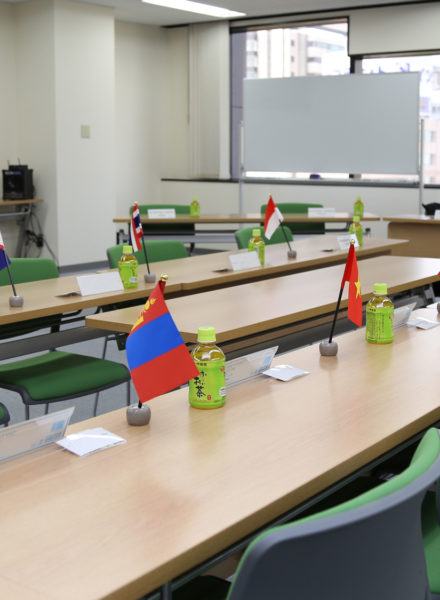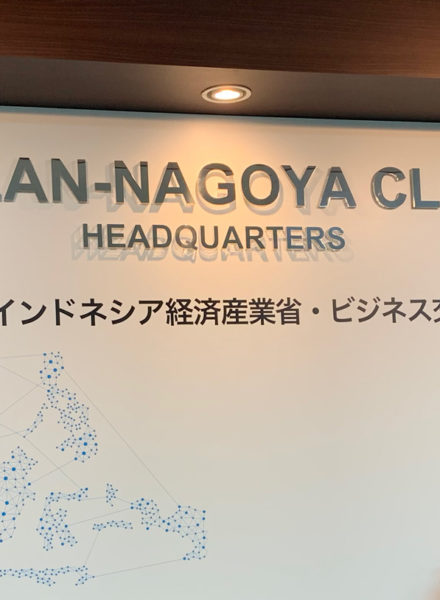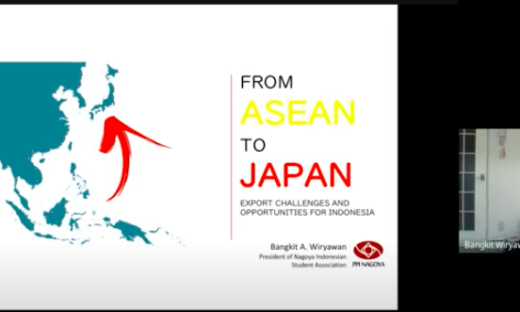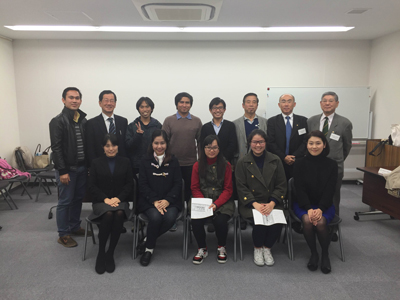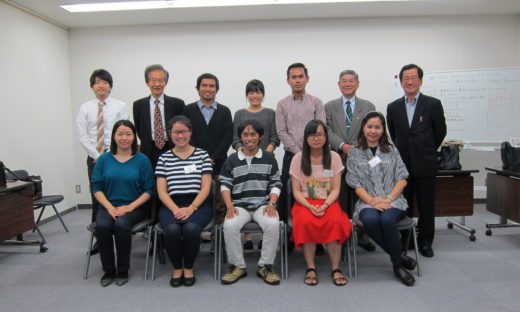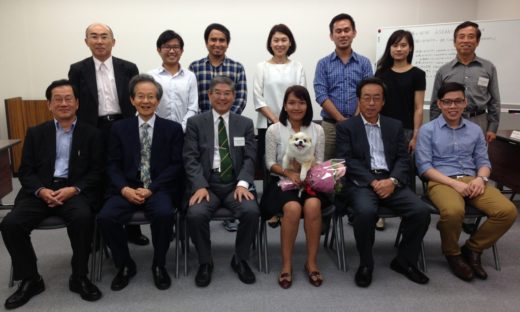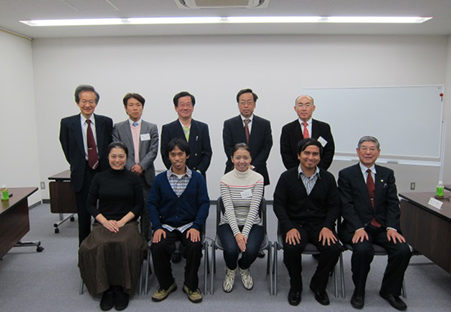第1回ミーティング報告書 2014年8月18日 The 1st Meeting Report on August 18, 2014
今日は、第一回目です。名古屋大学大学院国際開発研究科の荻巣先生のコーディネートでASEANからの留学生の皆さんにお集まりいただきました。第一回目で初顔合わせです。まずはカンボジアから2名、インドネシアから1名の留学生の方と話し合うことができまました。
国際開発研究科への留学には日本語が必須となっていないため、幅広く日本文化に触れる機会が少ないそうです。どちらかといえば、寄宿舎と大学の往復の毎日を過ごし、研究期間を過ぎると母国に帰られるそうです。国費留学生として国から派遣され、様々な経験を積み、多角的な視野を身につけて母国に帰ることが重要だと思いますが、留学生の皆さんの感想を聞きますと、現実はそのようにはなっていないそうです。帰国後、母国の発展を担っていかれる彼らのことを考えますと、日本での留学経験はやや物足りない面があるかもしれません。
一方、日本とアセアンの関係は今後、経済関係を軸に急速に深まっていくでしょう。中国の生産拠点としてのコスト上昇、および政治的要因が日本企業のASEANシフトを加速させています。ASEAN-NAGOYA CLUBは、日本の企業家が有志となってASEANと日本の健全な発展を願い、少しでも次世代のお役に立てばと組成いたしました。
現役世代は日本本社のノルマに追われ、心に余裕がないことでしょう。また促成の国際人として言語を学び、日本方式を携えてASEAN各国に赴任していくでしょう。CLUBの有志は、海外での経験を踏まえた知見として、グローバリゼーションを経済的側面のみで活動するには限界があると認識しています。それぞれの国には歴史と伝統があり、深いものがあります。日本文化と進出国との文化の違いは何か。考え方の違いは何か。長年の経験から、こうした文化相違、価値観の相違を踏まえたうえで、経済活動をすることがとても重要であると痛感しています。いわゆる相互理解のない関係は成り立たないと考えています。ASEAN各国への経済進出が日本文化の押し付けとなっては摩擦を惹起することにもなりかねません。グローバリゼーションとは多様性を認め合う中で、共通の価値を見出し、経済関係につなげていくことではないでしょうか。
そうした相互理解の大切さがASEAN-NAGOYA CLUBの柱であることを話し合いました。留学生の皆さんにも、その心が響いたようでした。ミーティングが終わり、湯豆腐専門店に場所を移して、率直な話し合いをしました。まずは日本側のメッセージを伝えることが主要なテーマとなりました。日本側からは製造、金融、流通、サービスとそれぞれ培ってきた経験を有志の皆さんがお話されました。日本文化とは何か、日本精神のよって立つところはなにか。また日本の悪いところは何か。ASEANの皆さんは日本をどのように捉えているのか。 第一回目の目的は、お互いの考えを率直に交わすことでした。後日、留学生の皆さんからとても刺激的な日であり、日本の有志の皆さんとの出会いに感謝いたしますとのメッセージを受け取りました。荻巣先生と留学生の皆さんとの信頼関係が伝わってきます。この会が、長く続き、ASEANと日本の真の交流の一翼を担うことができればと思います。
Today is the first time for international students from ASEAN gathered under the coordination of Professor Ogisu, the Graduate School of International Development, Nagoya University. In this opportunity, we have a chance to talk to two international students from Cambodia and Indonesia. Since Japanese Language Proficiency is not too essential to be able to study at the Graduate School of International Development, there are few opportunities to widely learn about Japanese culture. Most of the students just spend their time going back and forth between the dormitory and the university every single day.
After they complete their study, there is no other choice but go back home as a government-sponsored international student. Actually, it is the right moment for the students to gain various experiences and acquire a multifaceted perspective considering they will be responsible for the development of their home country. In reality, however, the experience of studying in Japan might be a little unsatisfactory for most of them.
On the other hand, the relationship between Japan and ASEAN will rapidly deepen in the future, especially on economic relations. The increasing cost of production in China and political factors are some factors that accelerating the new partnership of Japanese companies (private sector activities) to ASEAN countries.
ASEAN-NAGOYA CLUB was established not only to intensify the relationships among Japanese private sectors and ASEAN countries as much as possible in the future, but also to empowered the next generation to create a hope of the development among Japan and ASEAN countries.
There are many International students interested in participating to this activity. They have motivations to learn more about the cultures and the languages. The club volunteers (participants) realize that the globalization can be carried out not only by emphasizing the economic interest, but also by understanding the culture, history, tradition, way of thinking, manners of living, the arts and the general institutions of a country through the introduction and diffusion of its own culture. To maintain harmonious relations with foreign countries, Japan must extensively introduce abroad the true picture of the nation which has a unique modern culture and manner of living rooted in a time-honored traditional culture.
From many years of experience, I am keenly aware how important to carry out economic activities by considering these cultural and value differences. I believe that the broad and smooth relations among countries are impossible to achieve without a nation’s culture understood by other countries and to respect and understand the cultures of other countries. Although it cannot be denied that the industrial technology and industries developed in Japan are still indispensable factors in raising the standards of living in ASEAN countries, each nation takes pride in its own dignity and its own culture. Imposing of Japanese culture to be accepted to other countries may cause friction. Globalization is about finding common values and connecting them to economic relationships while acknowledging diversity. We discussed that the importance of such mutual understanding is a pillar of ASEAN-NAGOYA CLUB.
We also had a discussion Yudofu as a representative of Japanese Businessmen to convey the message about their experience in manufacturing, finance, distribution, and services. What is Japanese culture and Japanese spirit? What is wrong with Japan? How do ASEAN people perceive Japan? The main purpose was to exchange the ideas with each other.
Last but not least, we would like to thank all the participants, Professor Ogisu, private sectors, and international students for taking a part in this meeting by promoting the mutual understanding among Japan and ASEAN countries. We would hope to continue our meeting in the future.
